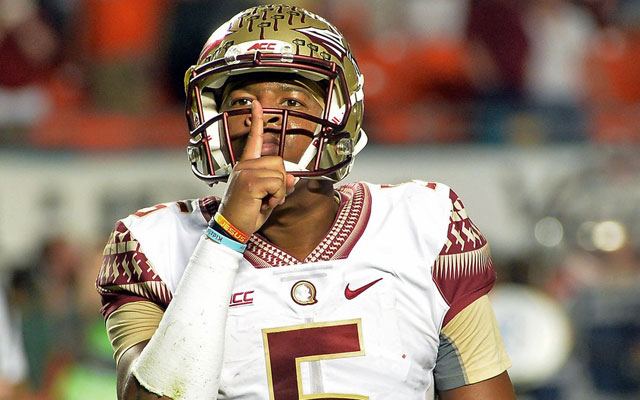FSU QB Jameis Winston’s 2013 Heisman Trophy-winning season was marred by a controversial rape accusation.
READ MORE:
Evan Mathis named to Pro Bowl – Eagles Guard replaces Jahri Evans in Pro Bowl Perry Fewell fired by Giants – New York Giants part ways with DC Fewell Jameis Winston entering NFL – Winston’s father says he will enter NFL
Attorneys for the woman who accused Florida State quarterback Jameis Winston of sexually assaulting her in December 2012 filed a civil suit on Wednesday against the university, alleging FSU didn’t properly protect her Title IX rights.
Attorneys for the woman, a former FSU student, filed the civil suit in U.S. District Court for the Middle District of Florida in Orlando on Wednesday morning, according to John Clune, one of her attorneys.
In the lawsuit, the woman’s attorneys demand a trial by jury and damages from FSU for fostering a “hostile educational environment.” Her attorneys allege that FSU’s athletics department deliberately concealed the reported rape from the rest of the university and didn’t properly investigate the allegations as required by federal Title IX laws.
The woman alleges that Winston, the 2013 Heisman Trophy winner, sexually assaulted her in his apartment on Dec. 7, 2012. Winston and his attorneys contend the sexual encounter was consensual. Tallahasse police and the state attorney’s office there never charged Winston in the case.
Last month, Winston was cleared of four violations of FSU’s student conduct code hearing after a two-day student judiciary hearing. On Dec. 21, retired Florida State Supreme Court chief justice Major Harding ruled that evidence was “insufficient to satisfy the burden of proof.”
In his ruling, Harding wrote, “In light of all the circumstances, I do not find the credibility of one story substantially stronger than that of the other. Both have their own strengths and weaknesses. I cannot find with any confidence that the events as set forth by you, [the accuser], or a particular combination thereof is more probable than not as required to find you responsible for the violation of the Code. Therein lies the determinative factor of my decision.”
State attorney Willie Meggs made a similar decision in December 2013, when he chose not to bring criminal charges against Winston after his office investigated the case.

COMMENTS